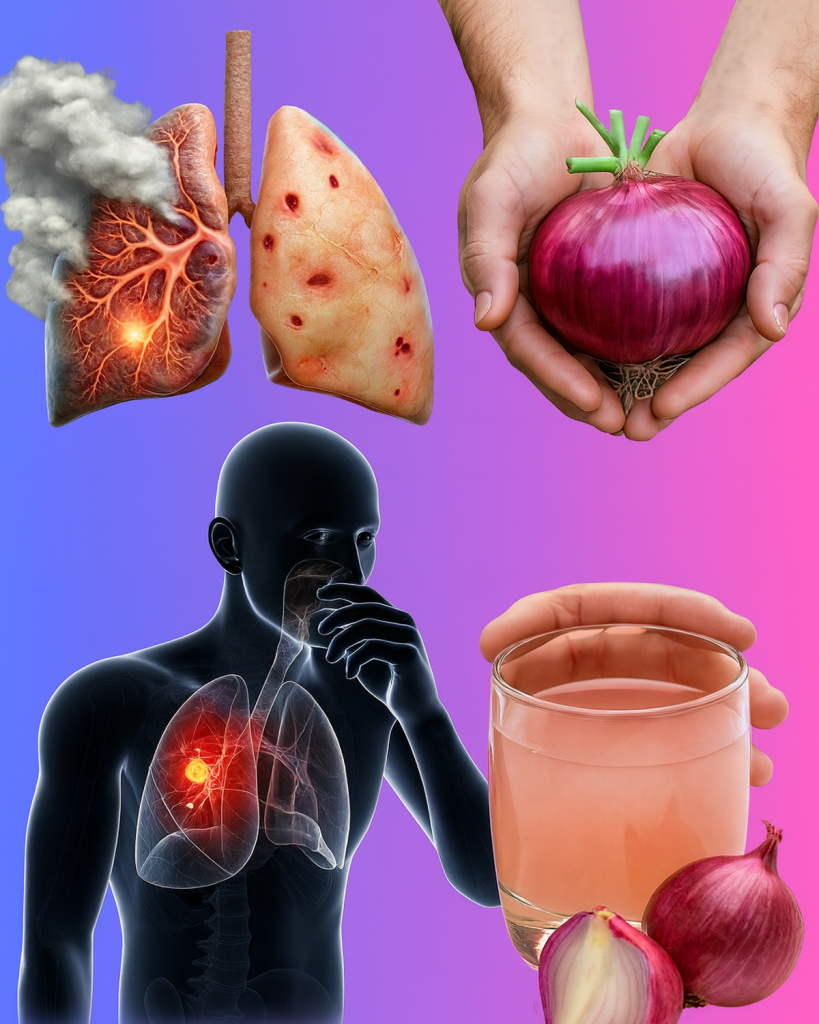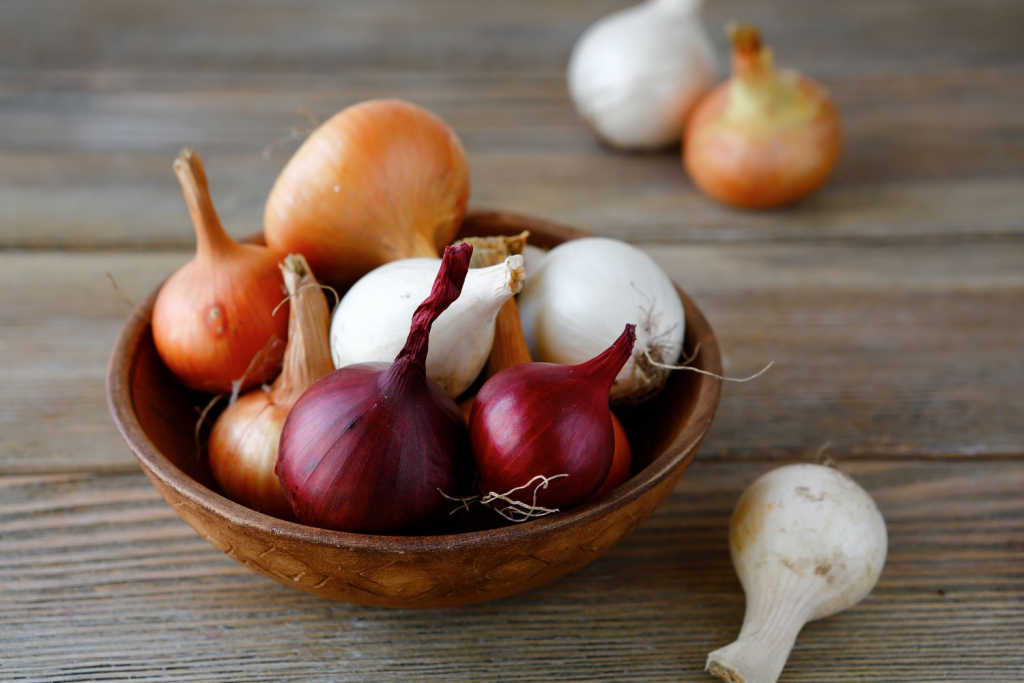Did you know that according to the World Health Organization, more than 300 million people around the globe suffer from chronic respiratory conditions such as bronchitis? Persistent coughing, wheezing, and chest tightness can interfere with daily life, leaving people searching for natural relief. While modern medicine offers many solutions, folk remedies continue to capture attention because they rely on simple, accessible ingredients. One of the most surprising yet powerful ingredients is the common onion.
Onions are not just for cooking. For centuries, they have been used in traditional medicine to support respiratory health. Rich in antioxidants, sulfur compounds, and natural anti-inflammatory properties, onions are believed to help loosen mucus, ease coughing, and support lung function. Could this kitchen staple actually help cleanse your lungs and calm persistent coughs in just a few days?
In this article, we’ll explore the science behind onion-based remedies, share step-by-step recipes for easing cough and bronchitis, and discuss practical tips for safe use. By the end, you’ll understand how this humble vegetable could become a natural ally in your wellness routine.

Why Onions Are Powerful for Lung Health
Natural Compounds in Onions
Onions contain bioactive compounds that may help respiratory health:
| Compound | Potential Role |
|---|---|
| Sulfur compounds | Support mucus breakdown and easier breathing |
| Quercetin (antioxidant) | May reduce airway inflammation |
| Vitamin C | Helps boost immunity and repair tissues |
| Flavonoids | Provide antioxidant protection against oxidative stress |
Traditional Use Around the World
- In Eastern Europe, onion syrup has long been used to soothe persistent coughs.
- In parts of Asia, onion teas are given to children with chest congestion.
- Folk medicine often combines onions with honey or lemon to create powerful natural syrups.
These traditions align with what modern studies suggest: onions can support the respiratory system by acting as an expectorant, helping to clear mucus.

Onion-Based Recipe for Bronchitis and Cough Relief
Ingredients You’ll Need
- 1 large onion (yellow or red)
- 2 tablespoons of raw honey (optional but recommended)
- 1 cup of water
- A small saucepan
Preparation Method
- Peel and finely chop the onion.
- Place the onion pieces in a saucepan and add one cup of water.
- Bring the mixture to a gentle boil, then lower the heat and simmer for 10–15 minutes.
- Allow it to cool slightly, then strain the liquid.
- Stir in two tablespoons of honey for added soothing properties.
How to Use
- Drink one tablespoon of this onion syrup 2–3 times per day.
- For best results, use for three consecutive days to ease coughing and loosen mucus.
- Children can take half the dose, but always consult a healthcare provider before use.

Variations of the Onion Remedy
Onion and Honey Syrup (No Cooking)
- Slice one large onion thinly.
- Layer the onion slices in a jar with raw honey.
- Cover and leave overnight.
- By morning, the jar will contain a natural syrup that can be taken by the spoonful.
Onion Tea with Lemon and Ginger
- Boil chopped onion with fresh ginger slices in water.
- Strain and add lemon juice and honey.
- Drink warm to soothe the throat and ease congestion.
These variations give you options depending on your taste preferences and the ingredients you have available.

Real-Life Experiences and Case Studies
Case 1: Winter Cough Relief
Maria, a 45-year-old teacher, often struggled with lingering winter coughs. After trying onion-honey syrup, she noticed her throat felt soothed, and the coughing reduced within days.
Case 2: Support for Bronchitis Recovery
James, a retired carpenter, used onion tea during a bout of bronchitis. While he continued his prescribed medications, the tea helped thin mucus and made breathing easier.
Case 3: A Family Tradition
In many families, parents still prepare onion syrup for children with chest congestion, relying on passed-down recipes that have stood the test of time.
These personal accounts highlight how onion-based remedies can complement—not replace—medical care.

Safety Tips and Precautions
- Not a cure: Onion remedies can help relieve symptoms, but they are not a substitute for medical treatment of bronchitis or serious lung conditions.
- Possible allergies: Some people may be sensitive to onions. Always test with a small amount first.
- Children and infants: Avoid giving honey to children under one year old due to the risk of botulism.
- When to see a doctor: If coughing persists for more than two weeks, if you have high fever, or if you cough up blood, seek medical advice immediately.
Onion Remedies Compared with Other Natural Options
| Remedy | Benefits | Considerations |
|---|---|---|
| Onion syrup | Simple, natural expectorant, widely available | Strong taste and odor |
| Ginger tea | Anti-inflammatory, warms the respiratory tract | May cause heartburn in sensitive individuals |
| Honey-lemon water | Soothes throat, boosts immunity | Not suitable for infants under 1 year |
| Turmeric milk | Anti-inflammatory and antioxidant | Flavor may be strong for some |
Combining onions with honey, lemon, or ginger often enhances their effectiveness, creating a holistic approach to respiratory wellness.

Conclusion
Onion-based remedies may sound simple, but they have a long history of supporting respiratory health. Their natural compounds, antioxidant properties, and expectorant effects make them an accessible option for easing coughs and supporting lung function.
Key Takeaways
- Onion syrups and teas are traditional remedies for cough and bronchitis.
- They work by loosening mucus, soothing the throat, and supporting immunity.
- These remedies should complement—not replace—professional medical care.
- Always consult a healthcare provider if symptoms are severe or persistent.
This content is provided for educational purposes only and is not a substitute for professional medical advice. Always consult your doctor or healthcare provider before trying new remedies, especially if you have existing conditions or are taking medications.




